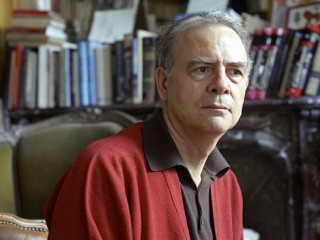
Patrick Modiano biography
Date of birth : 1945-07-30
Date of death : -
Birthplace : Boulogne-Billancourt, France
Nationality : French
Category : Arts and Entertainment
Last modified : 2024-07-30
Credited as : Novelist, Nobel Prize in Literature, autofiction, World War II, French literature, memory, identity, Paris, historical fiction
30 votes so far
Patrick Modiano: Nobel Laureate and Master of Memory
Jean Patrick Modiano is a French novelist and recipient of the 2014 Nobel Prize in Literature. He previously won the 2012 Austrian State Prize for European Literature, the 2010 Prix mondial Cino Del Duca from the Institut de France for lifetime achievement, the 1978 Prix Goncourt for Rue des boutiques obscures, and the 1972 Grand Prix du roman de l'Académie française for Les Boulevards de ceinture. His works have been translated into more than 30 languages and have been celebrated in and around France, but most of his novels had not been translated into English before he was awarded the Nobel Prize.
The Nobel Prize in Literature 2014 was awarded to Patrick Modiano "for the art of memory with which he has evoked the most ungraspable human destinies and uncovered the life-world of the occupation".
Early Life and Family Background
Jean Patrick Modiano, commonly known as Patrick Modiano, was born on July 30, 1945, in Boulogne-Billancourt, a suburb of Paris. His father, Albert Modiano, of Jewish-Italian descent, was part of the well-known Modiano family from Thessaloniki, Greece. His mother, Louisa Colpeyn, was a Flemish actress. The couple met in occupied Paris during World War II and maintained a semi-clandestine relationship.
Modiano's childhood was marked by the absence of his parents. Initially raised by his maternal grandparents, he learned Flemish as his first language. His brother, Rudy, who passed away at a young age, was a significant figure in Modiano's early life, with many of his works dedicated to Rudy.
Education and Early Influences
Patrick Modiano attended several schools, including École du Montcel, Collège Saint-Joseph de Thônes, and Lycée Henri-IV in Paris. A pivotal moment in his educational journey was his geometry lessons with the writer Raymond Queneau, who would later introduce Modiano to the literary world. Although Modiano enrolled at the Sorbonne, he did not complete a degree, preferring to pursue his passion for writing.
Literary Career and Achievements
Modiano's literary career began in earnest with the publication of his first novel, La Place de l'Étoile, in 1968. The novel, a wartime story about a Jewish collaborator, established Modiano's thematic focus on memory, identity, and the haunting legacy of World War II. His father's disapproval of the book only added to its controversial impact.
Over the decades, Modiano has authored more than 40 books, exploring the intricate dance between individual and collective memory, identity, and the shadows of the past. His works have been translated into over 30 languages, although many were not available in English until after he received the Nobel Prize in Literature in 2014.
Major Works and Themes
Modiano's novels are characterized by their deep engagement with the past, particularly the era of the German occupation of France. His notable works include Rue des boutiques obscures (Missing Person), which won the Prix Goncourt in 1978, and Les Boulevards de ceinture, which received the Grand Prix du roman de l'Académie française in 1972.
In Dora Bruder (The Search Warrant), Modiano fuses biography, autobiography, and detective fiction to recount the story of a young Jewish girl who perished in Auschwitz. This novel exemplifies Modiano's commitment to uncovering forgotten histories and the ephemeral nature of memory.
Personal Life
In 1970, Patrick Modiano married Dominique Zehrfuss. The couple had two daughters, Zina and Marie. Their wedding day, marked by rain and a memorable argument between the literary giants Queneau and Malraux, became a family anecdote.
Recognition and Legacy
Modiano's contributions to literature have been widely recognized. He has received numerous awards, including the 2012 Austrian State Prize for European Literature and the 2010 Prix mondial Cino Del Duca for lifetime achievement. His works, particularly those delving into the dark corners of World War II and the human psyche, continue to resonate with readers worldwide.
Modiano's literary journey reflects a relentless quest to piece together the fragments of the past, capturing the essence of human experience through his evocative prose. His portrayal of Paris, memory, and identity has solidified his place as one of the most significant figures in contemporary French literature.
Awards and honors of Patrick Modiano:
1968: Prix Roger-Nimier and the Prix Fénéon for La Place de l'Étoile
1972: Grand prix du roman de l'Académie française for Les Boulevards de ceinture
1976: Prix des libraires for Villa Triste
1978: Prix Goncourt for Rue des Boutiques obscures
1984: Prix littéraire Prince-Pierre-de-Monaco for his body of work
1990: Prix Relay for Voyage de noces
2000: Grand prix de littérature Paul-Morand for his body of work
2002: Prix Jean-Monnet de littérature européenne du département de Charente for La Petite Bijou
2010: Prix mondial Cino Del Duca for his body of work
2011: Prix de la BnF and the Prix Marguerite-Duras for his body of work
2012: Austrian State Prize for European Literature
2014: Nobel Prize in Literature
















